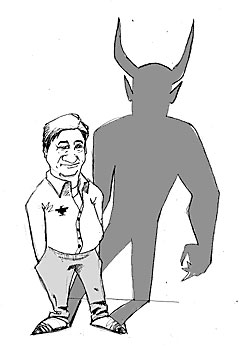
Illustration by Arnie Bermudez
|
|
Arizona Daily Wildcat
Wednesday October 15, 2003
Right to rename Econ. building?
On Sunday, the Economics building on the UA campus was officially renamed the César Chávez building, in honor of the late union leader. The change was not without controversy, however, and the renaming ceremony occasioned a protest decrying the decision by administrators.
We asked our columnists: Was the renaming a wise move, or a poor choice?
 |
|
Daniel Scarpinato
columnist
|
|
|
Name a building after Pacheco, not Chávez
Renaming the Economics building after César Chávez is a problem in two ways.
First, Chávez had no direct impact on the UA. Building names should either reflect the fields situated in them or honor individuals who had an impact on the university ų financially or otherwise.
Also, as we are finding out, Chávez was a controversial figure. He doesn't hold the immaculate record of a Martin Luther King Jr. or John F. Kennedy, who were both political figures but are almost universally respected.
Reasoned arguments have been made by Erik Flesch, president of the Student Objectivist Society, that discredit much of the romance of the historical Chávez figure.
Chávez was a union boss whose tactics and causes were far from inclusive and straightforward.
By naming the building after such a radical figure, the UA is sending the wrong message.
But really, the naming stands for more. It's one step in a broad campaign to make the UA a Hispanic-serving institution. The motive: big cash ų like it or not.
Now, there's no problem with promoting equality and showing respect to all groups on campus, but honoring the Hispanic community on campus takes more than renaming a building after a union leader.
So why not keep politics out of UA buildings, and if we must pander, then name the old Economics building after someone like Manual Pacheco, the UA's first and only Hispanic president ų a man who wished to desegregate minority studies and infuse them into mainstream academics.
Daniel Scarpinato is a journalism and political science senior.
He can be reached at letters@wildcat.arizona.edu
The end to union tactics justified the means
Allegedly, during farmers' strikes, Chávez and the strikers verbally and physically coerced strikebreakers into abandoning their new jobs to join the picket lines. And it's certainly true that, when he worked for the Community Services Organization, he established a "hiring hall" that forced the growers' association to hire exclusively through the CSO.
But not all is what it first appears to be.
If a business is to survive a siege, it has to bring in new workers, and if
strikers are to get what they want and not become jobless in the process, they have to get the strikebreakers out of the way. It's not a game; they'll use whatever means necessary. Besides, we aren't talking about getting dental care. Chávez was dealing with the blatant abuse of impoverished employees who needed a champion. Half of what Mexican-American farm workers were dealing with ų terrible wages and working conditions ų won't fly today ∑ and that's largely because of Chávez and the organization he worked a lifetime to found: the United Farm Workers.
Yes, he forced the growers' association to hire through the CSO ų but to stop the bracero program, which brought in desperate Mexicans and worked them for nearly nothing in labor camps. They were sent back to Mexico at the end of the growing season, and if they complained they were deported.
Chávez didn't always use peaceful tactics, but sometimes the ends justifies the means. If he was ever "un-American," it was in order to overthrow an economic system that was absolutely shameful. How appropriate, then, that the Economics building should be named after him.
Sabrina Noble is an English and creative writing senior.
She can be reached at letters@wildcat.arizona.edu
Chávez building rename a cunning power play by Likins
César Chávez is a national Hispanic civil rights icon. Whether you like it or not, it is a reality. He was a defender of the rights and human dignity of all the exploited migrant workers, not just the ones of Hispanic ethnicity. His movement originally started in conjunction with the exploitation of Filipino grape pickers.
The movement was not intended to be exclusively for Hispanic peoples ų it just so happens that a portion of the Hispanic community in this country has endorsed him and his movement as such. Chávez's name has been attached to schools, parks and research centers in other schools ų primarily in California. Changing the name of the Economics building is not a problem; it is not distracting any of the students from their scholarship, nor is it causing harm.
However, what prompted President Likins to change the name of the Economics building right now, and his true motivation for doing so, is enigmatic.
He could have decided to change the name of the Mexican American Studies and Research Center itself to include Chávez's name ų as UCLA has done ų instead of changing the whole building's name. No, he didn't want to do this because it was not visible enough to the Hispanic student community. The purpose for President Likins' overt support for this name change is reflective of his tacit strategy to draw in more federal grant money, which would only be realized with an increase in Hispanic student enrollment.
Ryan Scalise is a political science senior.
He can be reached at letters@wildcat.arizona.edu
Racist opposition must be put into perspective
Several campus groups have managed to dredge up everything they could find about César Chávez in hopes of using it to justify their protests of renaming of the Economics building in his honor. They have called him militant, communist and just about everything in between.
This kind of treatment from protesters is not unique to Chávez. Many of the same claims have been made about Dr. Martin Luther King Jr. when protests arose against the holiday that exists in his name. Accusations that Dr. King was a communist traitor who condoned violence in the name of non-violence have come from the Ku Klux Klan itself.
The bottom line is that the KKK doesn't like what Dr. King stands for ų civil rights. The vast majority of the opposition to naming the Economics building after Chávez comes from white students who have never picked a tomato in their lives and who, like the KKK, are using the sound bytes of "socialist" and "militant" because they oppose what he stood for ų empowerment of immigrant farm workers. Opponents have even written that Chávez stood for "destructive political ideas."
A few drowned-out voices have raised valid issues, such as the fact that Chávez has no direct connection to UA or the classes that take place in the building that now bears his name. But most of the opposition has its roots in racist and xenophobic contempt for Chávez's support of immigrant farm workers. Wouldn't the KKK be proud?
Kendrick Wilson is a political science junior.
He can be reached at letters@wildcat.arizona.edu
 |
|
Chad Mills
guest columnist
|
|
|
Chávez renaming an attack on students' minds
César Chávez was a hypocritical union thug who used force and the threat of force to achieve his goals, despite explicitly denouncing violence.
Chávez's union gained national attention only after breaking a police order; reporters wanted to cover the conflict. Chávez publicly supported a New Mexican group right after it led a violent assault on a courthouse; two law enforcement officers were killed in the attack.
In the 1960s, during the famous Delano grape strikes, less than 1 percent of California grape workers joined the union. Union strikers would harass, cajole and fire gunshots over workers' heads until they stopped coming to their newly-violent workplace.
Whatever Chávez's intentions, goals and motivations were, these are undisputable facts. He led a union of militant socialists that used force and the threat of force to achieve its goals.
In an effort to double the Hispanic student population, UA President Peter Likins supported the renaming ų as if all Hispanics would approve of a militant socialist just because they share a common skin color.
The name of a public building is an endorsement by the government. It is a violation of citizens' rights for the government to endorse violence, socialism and compulsory unions. It is an attack on students' minds for the school to endorse César Chávez as a hero.
Chad Mills is an electrical engineering and computer science sophomore.
He can be reached at letters@wildcat.arizona.edu
New name is a nice move for university
To many students who have been here at the UA for the last few years, the Economics building will always be known as "Econ," regardless of what the sign says. For the remainder of my UA career, I will be one of them, simply because it has been ingrained in my head over the past five years.
This being said, the decision to re-name the building deserves applause. Putting everything aside, the bottom line is that the UA is honoring a civil rights leader who is native to Arizona and did his work here in the Southwest. Regardless of your opinion on this issue, you can't deny that fact.
Some argue that because Chávez didn't have a direct impact on the UA his name has no business being on one of our buildings. Although he may not have gone to UA, he certainly had an impact on the community the UA is a part of. He has every right to be celebrated as the leader he was to so many.
This gesture by the UA opens the door for many others that have dedicated their life to helping people here in the Southwest. Naming a building after them may be a small token for all their tremendous efforts, but it's one that will be remembered for as long as those buildings remain.
Jason Poreda is a political science and communication senior.
He can be reached at letters@wildcat.arizona.edu
